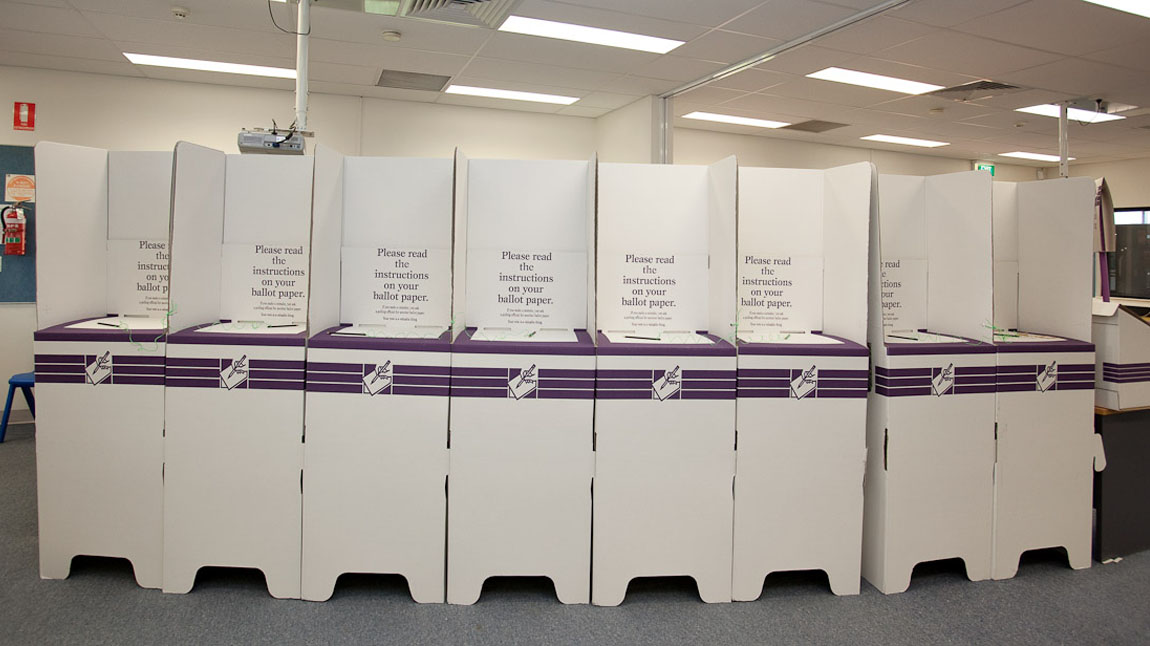Why politics is testing our faith

A fractured election, voter disenchantment, apathy and protest - are we losing faith or is this an opportunity for renewal?
Published 5 July 2016
In the seventh episode of the University of Melbourne’s monthly podcast series The Policy Shop on July 7, University of Melbourne Vice-Chancellor Professor Glyn Davis investigates what is driving an increasingly volatile and even disengaged electorate, and what it means. He will be joined by Dr Andrea Carson, from the School of Social and Political Sciences and Vote Compass, and Dr Lauren Rosewarne, Senior Lecturer in the School of Social and Political Sciences. Here we set the scene with Nicholas Reece, Principal Fellow at the Melbourne School of Government, and Professor Lisa Hill, from the University Adelaide.
If party politics was a football league, it would be an amateur competition played out in local parks.
According to a report last year the total membership of the Labor and Liberal parties combined barely numbered 100,000, while the Greens had about 10,000 members.
In contrast, paid up members of the 18 Australian Football League clubs numbered over 836,000. On Saturday the Australian Electoral Commission had more polling officials overseeing the vote than any of the individual political parties had members.
And established politics is fracturing. Almost a quarter of the primary vote on Saturday, 23.5 per cent, was cast for a party or candidate outside the two traditional adversaries, the Coalition or Labor.
At the same time surveys are showing that while compulsory voting is keeping participation high, Australians are becoming increasingly jaded about even the utility of voting.

A 2014 poll by the Australian National University and the Social Research Centre found that only 56 per cent of respondents felt their vote made a difference, down from 79 per cent back in 1996. Only 43 per cent felt it mattered who was in power, down steeply from 60 per cent in 2013 and 68 per cent in 2007.
Read more: Forcing your hand: Why we are made to vote
It paints a worrying picture of a democracy where significant numbers of citizens, particularly the young, just don’t seem to care or are disillusioned. Is our established political system letting us down?
Or perhaps is political society itself part of the problem as people turn away from wider politics and listen instead to what they want to hear or focus on single issues?
Nicholas reece, principal fellow, melbourne school of government
Nicholas Reece, a former Labor government advisor and former secretary of the Australian Labor Party in Victoria, says voter engagement is essential for a well functioning democracy, and that our institutions are in need of an upgrade in response to a more fragmented electorate.
“Decisions get made by the people who turn up, and if you have fewer people participating then you are going to get a narrower base for decisions, and ultimately you will get a lower quality democratic system,” Mr Reece says.
“People simply do not join political parties in anything like the numbers they once did, and Australia holds the wooden spoon for the lowest level of party membership of any advanced democracy in the world.
But the important institutional role that the parties play in the system remains the same. They are still by far the best vehicles for pursuing major change in society.”

Mr Reece argues that Australia is no longer a nation of joiners in the way it once was. Declining membership is not just an issue for political parties, it is a wider phenomena that affects other institutions like churches, unions and other community groups.
“The level of party identification is also in decline. In the same way as consumer markets have fragmented, the voting market is fragmenting with people more likely to vote for a niche party or candidate rather than one of the broad mainstream parties” says Mr Reece.
“In the 1950s you were either a Ford family or a Holden family. Now of course there are over 40 car makers in the market and literally hundreds of models. It is a similar story in the beer market and many others.
So consumer markets are fragmenting and the political market is fragmenting in the same way.
“The other thing occurring is that the electorate has become much more volatile, people are far more likely to switch their vote from one election to the next. People aren’t life-long followers anymore. They are likely to change their minds, and will switch their vote like they change their brand of toothpaste.”
Mr Reece argues that these changes have a profound effect on the operation of our political institutions.
“It is time to reassess and upgrade our democratic institutions. This could take many forms, but we need to start experimenting a bit, trying some new ways of capturing the will of the people or making collective decisions on behalf of our country,’’ Mr Reece says.
“We have a political system designed in the time of the horse and buggy trying to deal with a world to a hyper-connected, super speed, globalised information age. We need to have a good look at the major institutions of our democracy.
“I think one idea that shows promise is the use of citizen juries in more areas of government decision-making. Second, I think we need to change our political culture so that our elected representatives are required to compromise more to get things done.
“Hung parliaments and minority government are the new normal. Voters need to get used to it and our political leaders need to approach politics in a more discursive way and be able to compromise and negotiate more to get things done.’’
professor lisa hill, university of adelaide
New research from Professor Lisa Hill and Serrin Rutledge-Prior, from the School of History and Politics at the University of Adelaide, highlights that more Australians are deliberately spoiling their ballot, and it appears young people are driving it.
In the 2013 federal election the informal vote, or incorrectly filled out ballots, hit nearly 6 per cent, the highest level since 1984.
More worryingly, the proportion of ballots deliberately spoiled – they were left blank, scribbled on or included slogans and protests – is now nearly half of all informal votes when in 2001 such deliberate spoiling was just a third of the informal vote.

Professor Hill also found electorates with the highest levels of deliberate informal voting correlated with those having a higher proportion of 18-24-year-olds.
At the same time, her analysis of the Australian National University’s long-running Australian Election Study data shows young people value voting less, are less aligned to political parties, and are more cynical about whether their vote makes a difference.
“Young people are moving away from mainstream political parties and many don’t value their vote or believe their vote makes any difference,” Professor Hill says.
Instead she says young people are being increasingly drawn to single-issue causes, or are preferring to be politically active through petitions and “clicktivism,” rather than engaging with institutional politics.
Professor Hill also believes young people are more inclined to avoid political debates and conflict. Instead she argues young people are “narrow-casting” – preferring to listen only to those with whom they agree or identify.
The BREXIT vote was a case in point. YouGov polling suggests 71 per cent of 18-24-year-olds voted to remain, but they didn’t turn out in sufficient numbers to swing the vote. Instead, once the result was known, a protest petition was launched on Facebook.
Professor Hill says the disengagement of younger voters is frustrating because she argues Australia in particular has a sound electoral system that gives scope for representing diverse views and achieving change.
She says the system of allocating preferences means a vote counts much more than in a simple first-past-the-post system, and that a proportional system for electing the Senate provides great scope for minority parties.

“A lot of the thinking of young people disengaged from the political system is misguided. It isn’t meaningless to vote. People can’t argue there is no choice because there is lots of choice,” Professor Hill says. “Young people have to stop shooting themselves in the foot and become engaged. If you ignore politicians they will ignore you.”
Professor Hill suggests one way of better engaging not just young voters but all voters, would be to include an area on the ballot paper where voters could lodge a protest without wasting their vote.
Another suggestion aimed at the young would be to set aside some Senate seats for young candidates and have a separate electoral roll where only 18-24 year-olds get to vote for these candidates, while still also having a normal Senate vote. Professor Hill said it could be modeled on New Zealand’s system, where some seats are reserved for Maori candidates.
Banner: Alan/man on a wire/Flickr

